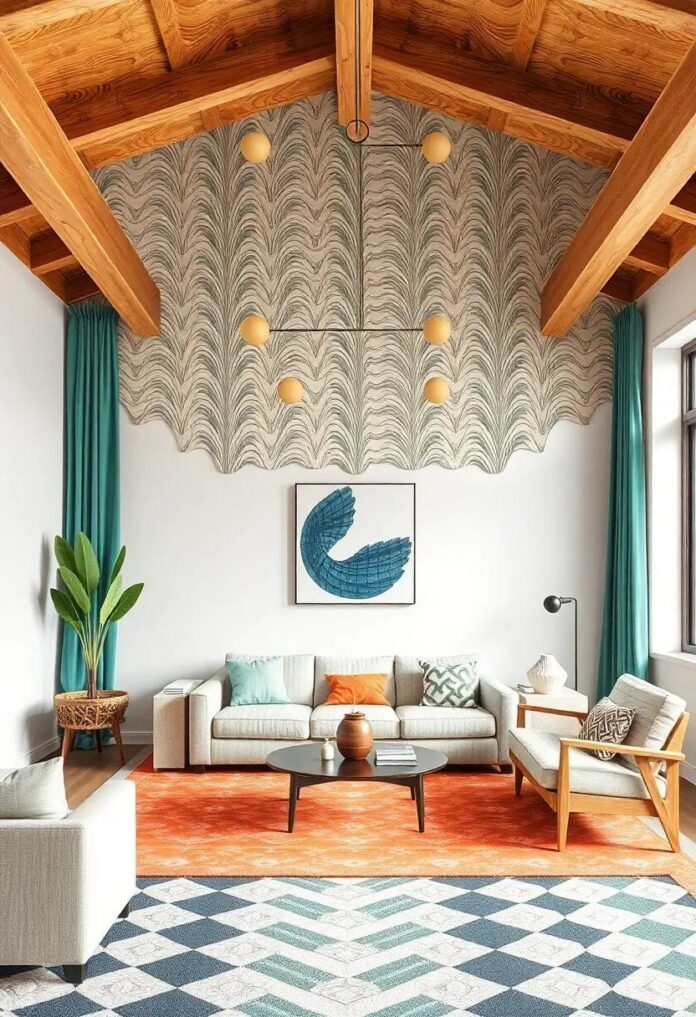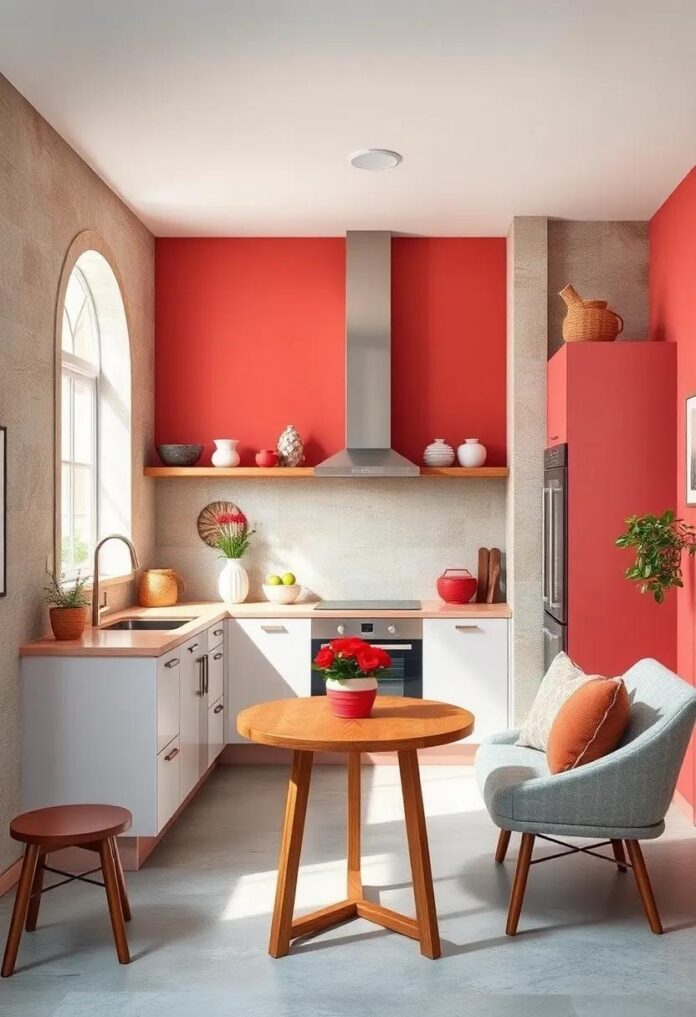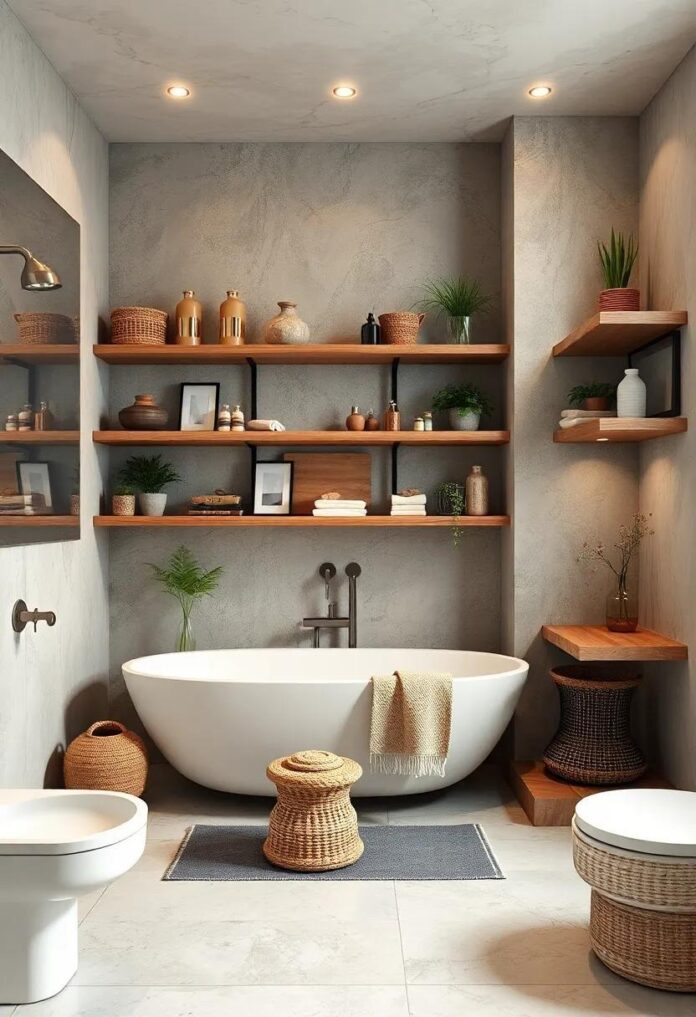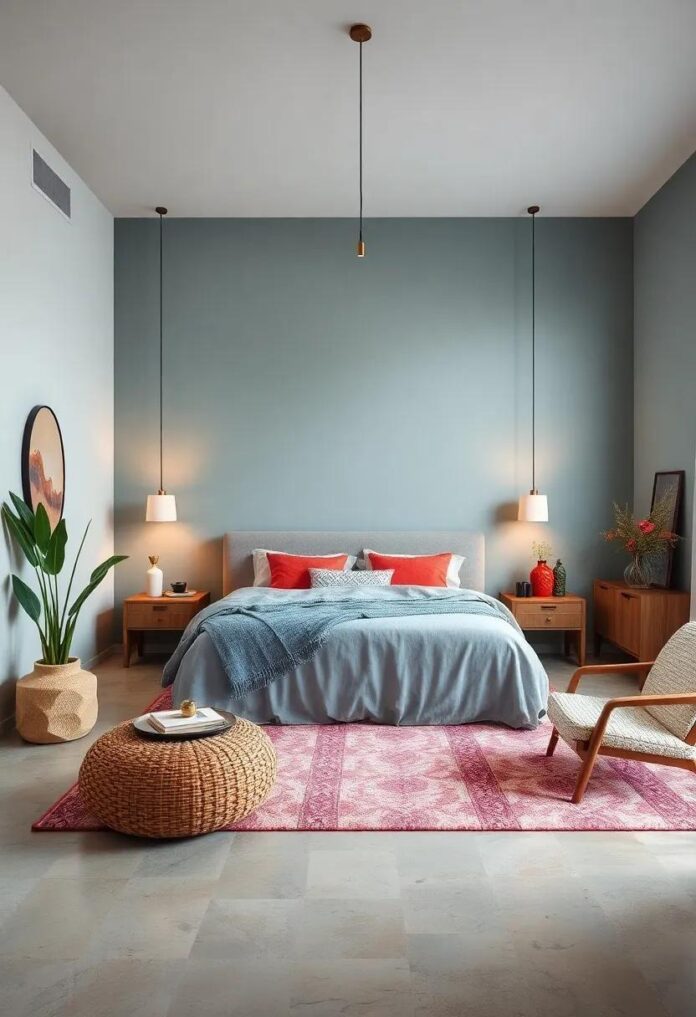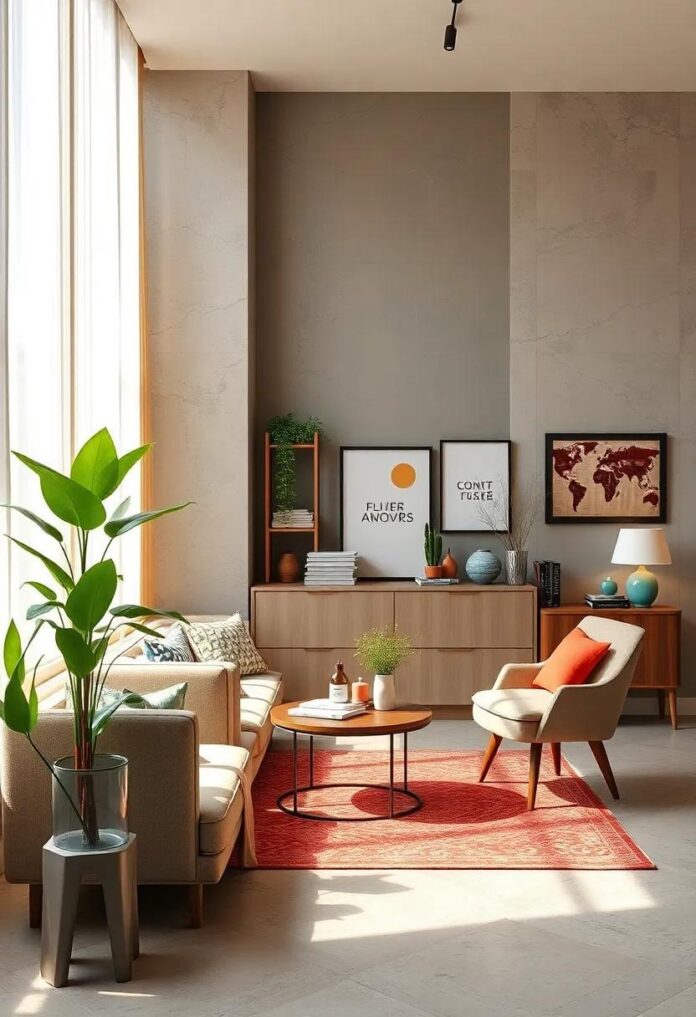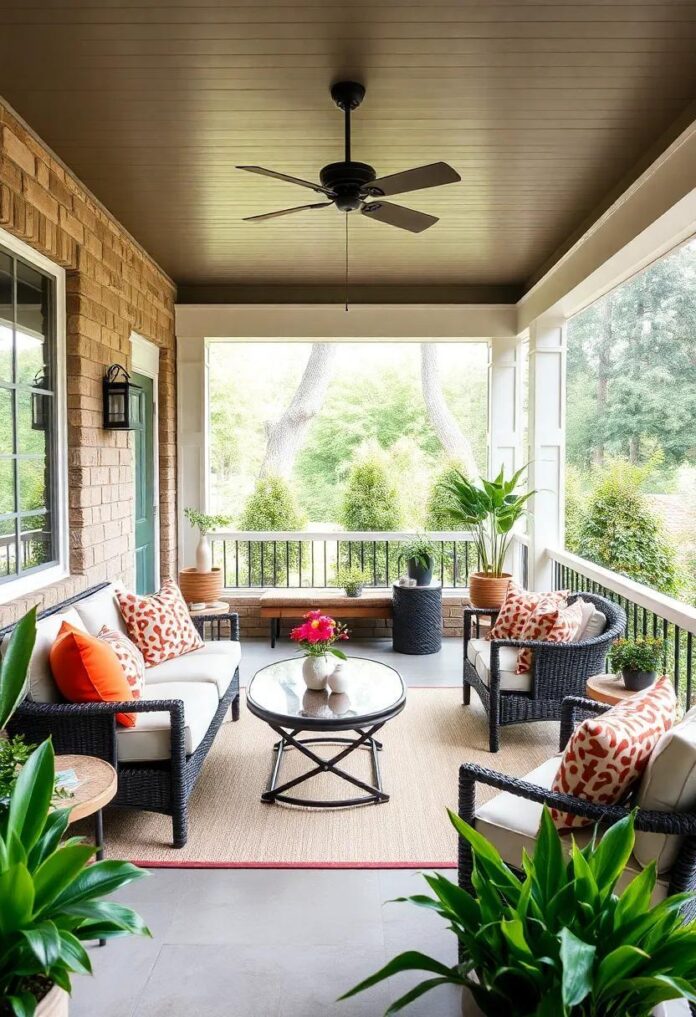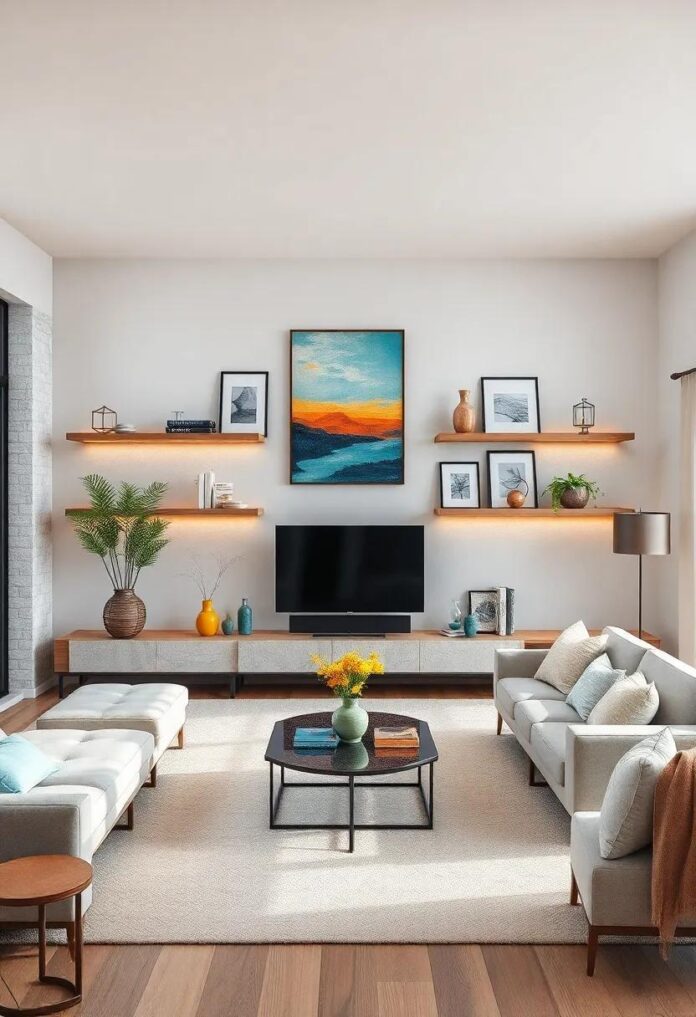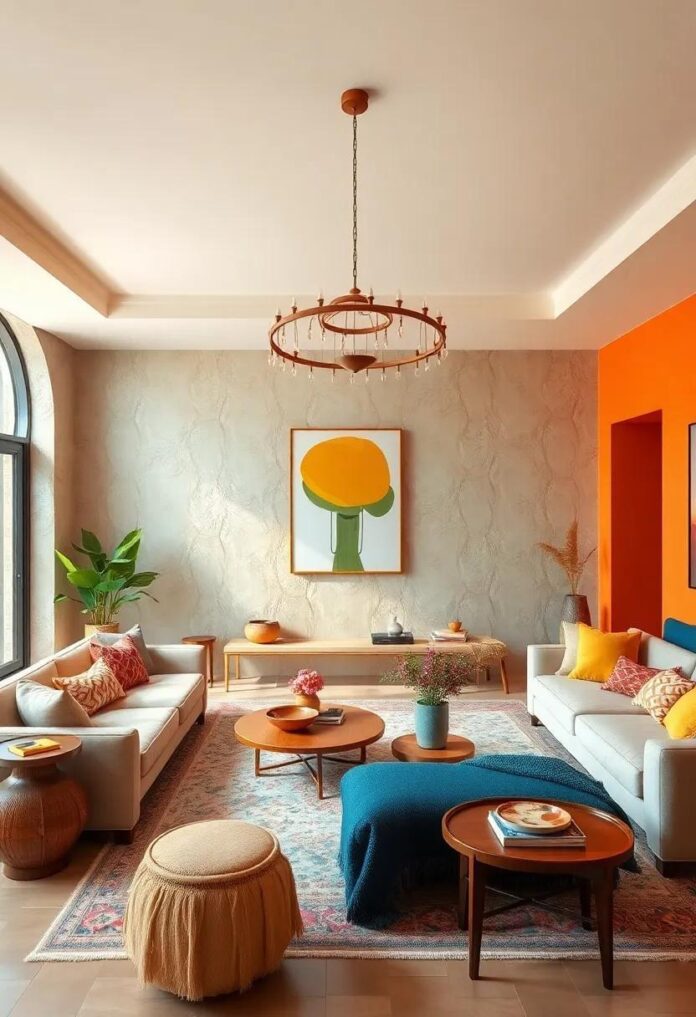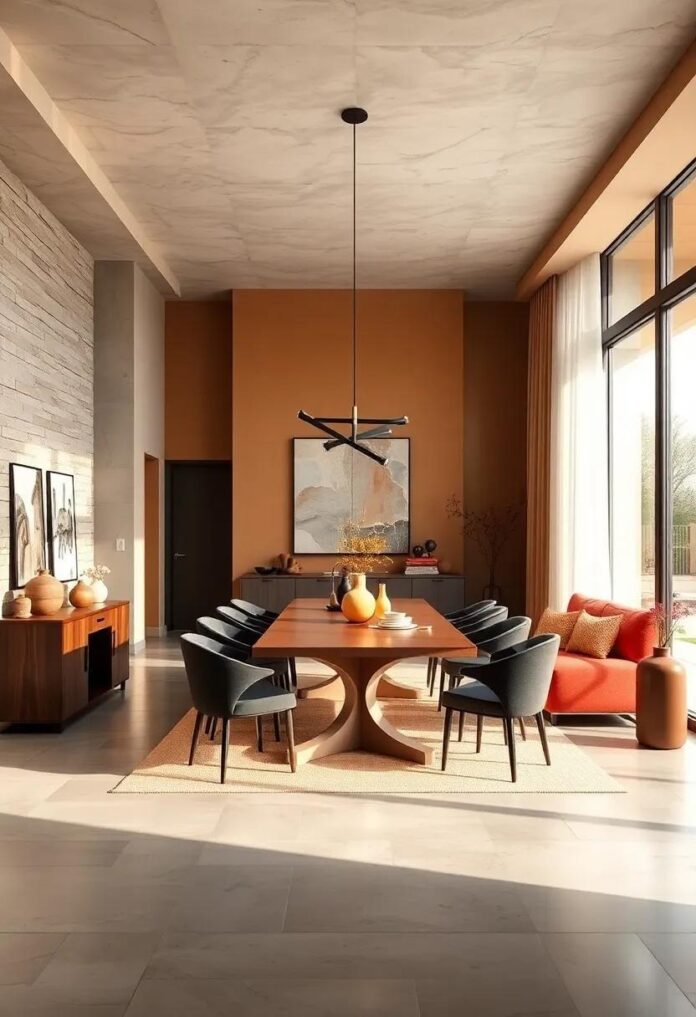In the realm of interior design, few eras stand as iconic as the mid-century period, a time when innovation and imagination flourished in tandem. Among the hallmark features of this architectural renaissance are the vibrant, expressive patterns that captivated the hearts and homes of many. “” invites you to rediscover the art of creating inviting spaces defined by daring prints and textures. As we traverse through the eclectic styles that defined an era, we’ll explore how these bold patterns not only transformed living rooms into lively sanctuaries but also reflected the cultural shifts and aspirations of their time. Join us on this journey as we unravel the stories behind these striking designs and uncover the timeless appeal thay hold in modern interiors.
Embracing Vibrant Geometry in Living Room Layouts
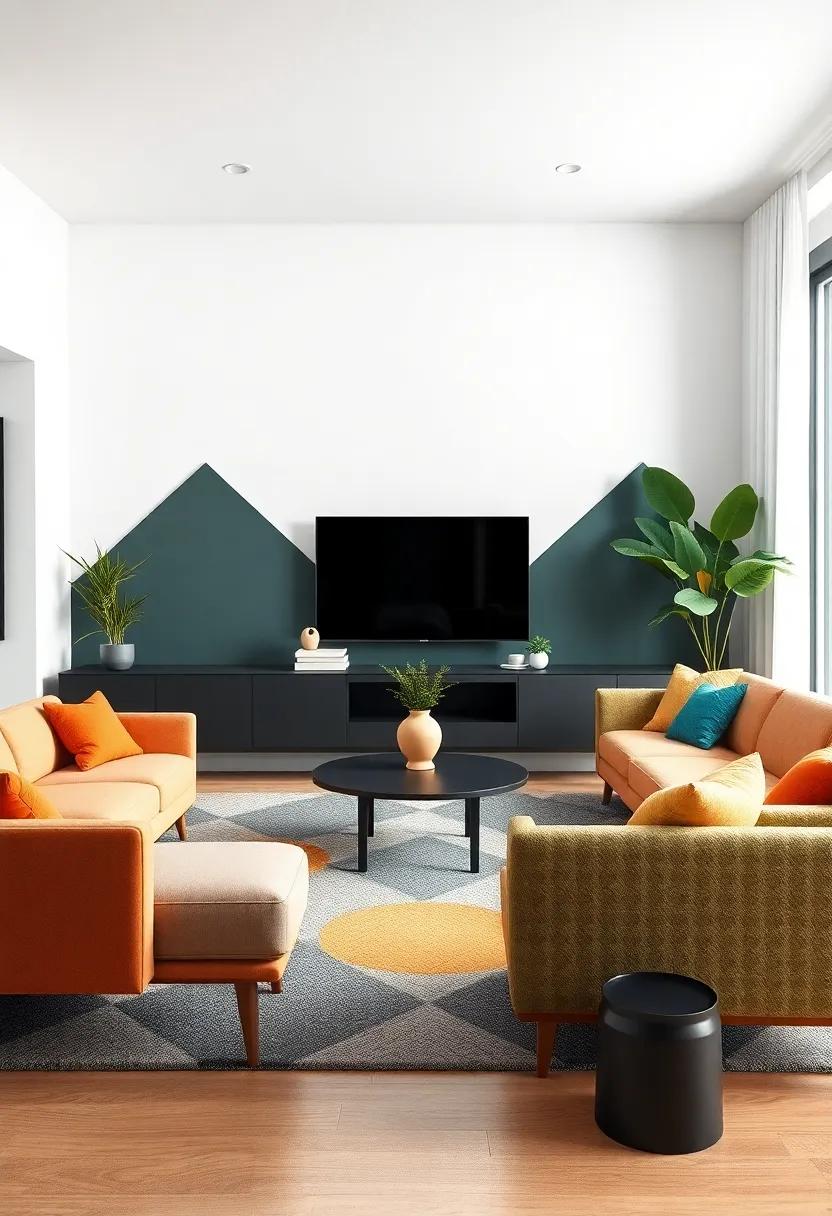
In the world of mid-century living room design, geometric patterns are more than just a trend; they serve as a bold statement of individuality and artistic expression. whether it’s the bold lines of a chevron sofa or the circular forms of a retro coffee table, these shapes work together to create a lively atmosphere. To incorporate vibrant geometry into your living space,consider mixing contrasting patterns while maintaining a cohesive color palette. Striking the perfect balance between various shapes, such as triangles, hexagons, and curves, can create visual interest without overwhelming the senses.
When designing your layout, focus on key pieces that stand out. As a notable example, an area rug featuring a vibrant geometric design can anchor the room, providing both style and comfort. Consider also the interplay of light and shadows, as these can enhance your geometric choices. Here’s a simple guide to the essential elements for a well-balanced living room space:
| Element | Description |
|---|---|
| Furniture | Opt for pieces with distinct geometric forms to emphasize shapes. |
| Textiles | Layer rugs and throws featuring bold patterns for depth. |
| Accessories | Use cushions and art with geometric designs as focal points. |
| Color | Choose a lively but complementary color scheme to bind the look. |
The Playfulness of color Combinations in Mid-Century Spaces
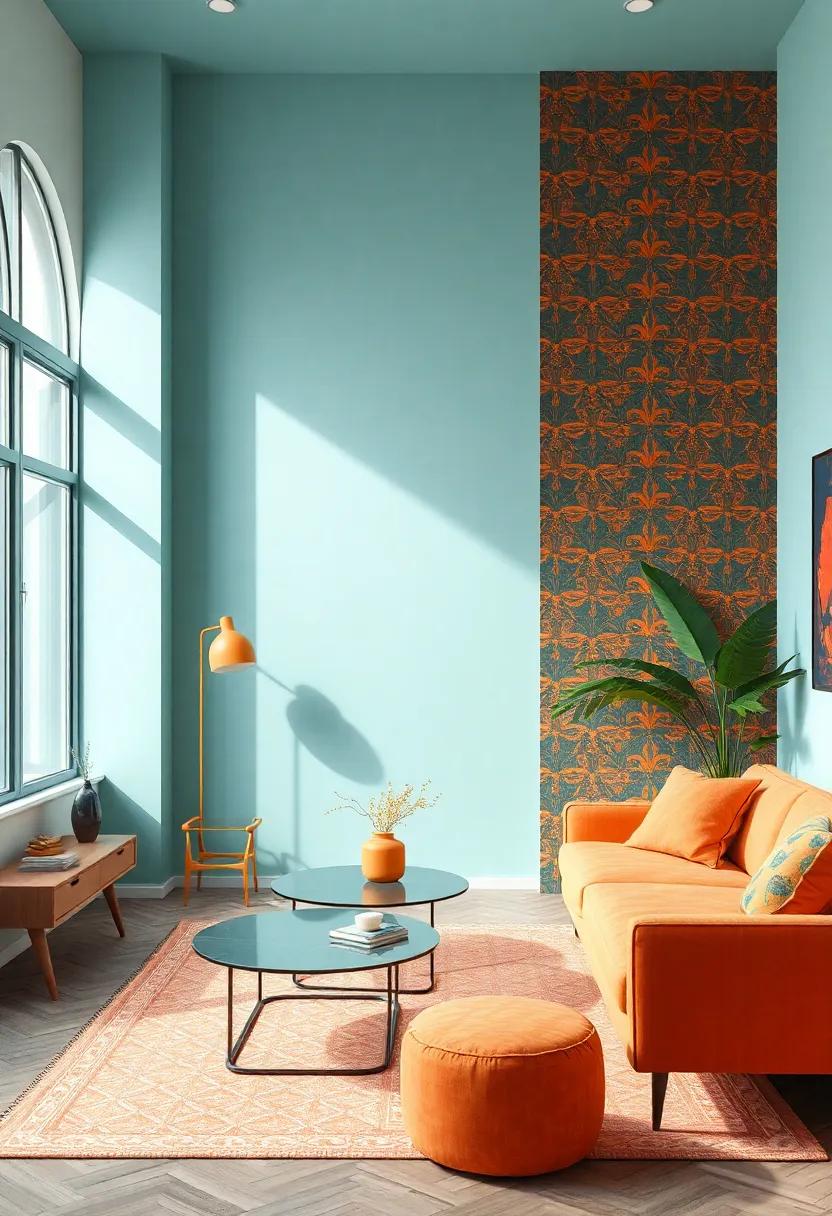
The vibrancy of mid-century design shines through in its fearless use of color combinations that evoke both energy and serenity. this era embraced a palette filled with bold hues and playful contrasts, often pairing shades like mustard yellow with teal blue or avocado green with burnt orange. Such pairings don’t merely coexist; they create visual dialogues that transform living spaces into dynamic canvases. This delightful interplay of colors enhances the spatial experience,captivating the eye and encouraging a sense of fun that is both nostalgic and modern.
Incorporating these playful color combinations offers a unique way to express individuality while adhering to a basic principle of harmony. Designers frequently enough shied away from the predictable, opting rather for unexpected accent walls, cheerful furniture upholstery, and striking art pieces. A well-curated selection of shades can evoke distinct moods and memories, reminding us of sun-drenched summers or cozy fireside evenings. Consider the following color pairing table that illustrates not only the choices but the feelings they can evoke:
| Color Combination | Evocative Feeling |
|---|---|
| Coral & turquoise | Vibrancy & Energy |
| Pine Green & Mustard | Warmth & Comfort |
| Plum & Slate Gray | Sophistication & Tranquility |
| peach & Navy | Playfulness & Balance |
Textured Fabrics that celebrate Retro Aesthetics
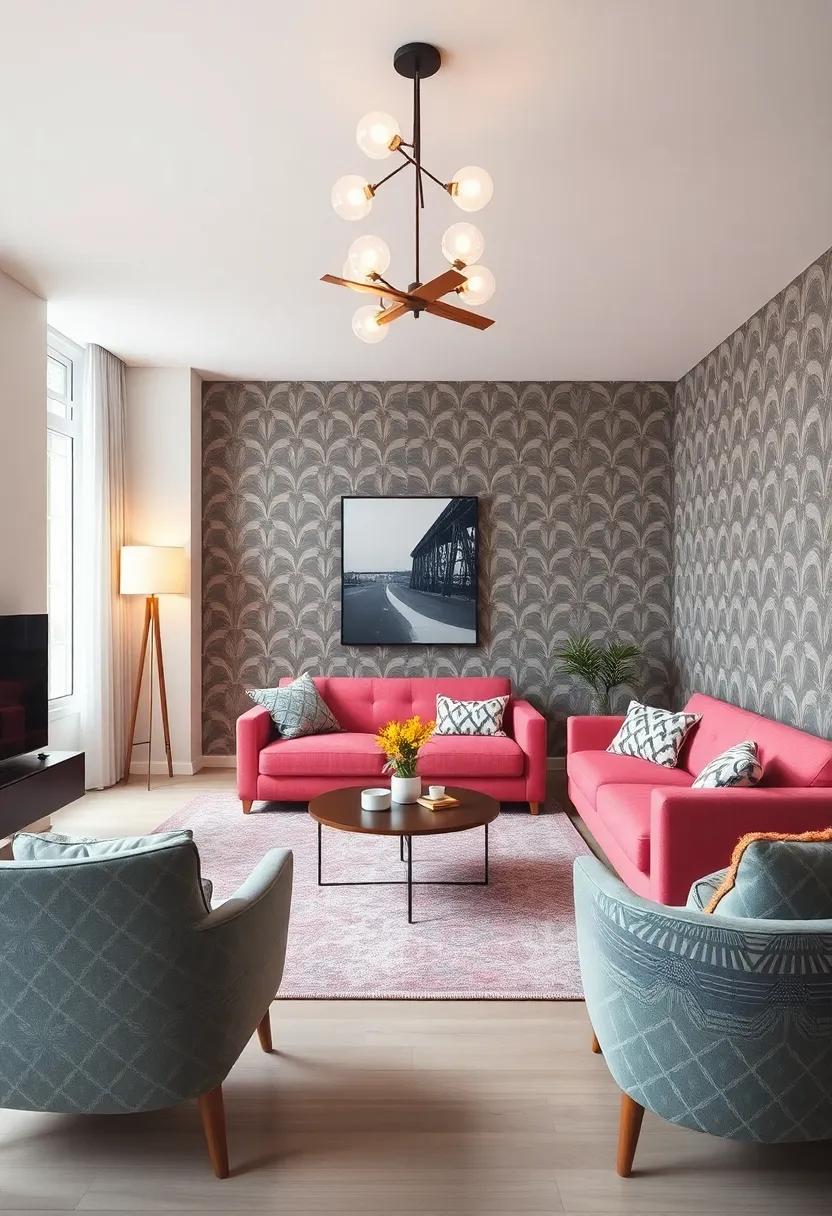
Textured fabrics are the lifeblood of mid-century modern design, breathing life and vibrancy into any living space. These materials not only evoke a sense of nostalgia but also tell a story of innovation and artistic freedom. You can play with a variety of textures to enhance the overall aesthetic, including:
- Velvet: Luxurious and smooth, it adds depth and warmth to your seating arrangements.
- tweed: Perfect for upholstery, its rich, tactile nature balances comfort with style.
- chenille: Soft and inviting, it offers a unique visual interest while encouraging relaxation.
- Jacquard: Woven with intricate patterns, it creates a refined backdrop to your mid-century decor.
When selecting fabrics, consider bold colors and geometric patterns that are hallmarks of this design era. These designs not only serve as a visual statement but also harmonize with the minimalist furniture typical of the time.Below is a simple table showcasing popular color palettes and their associated fabric types:
| Color Palette | Fabric Type |
|---|---|
| Mustard Yellow & Teal | Velvet |
| Olive Green & Rust | Tweed |
| Burnt Orange & Aqua | Chenille |
| Rich Brown & Cream | Jacquard |
Creating Focal Points with Bold Artwork and Patterns
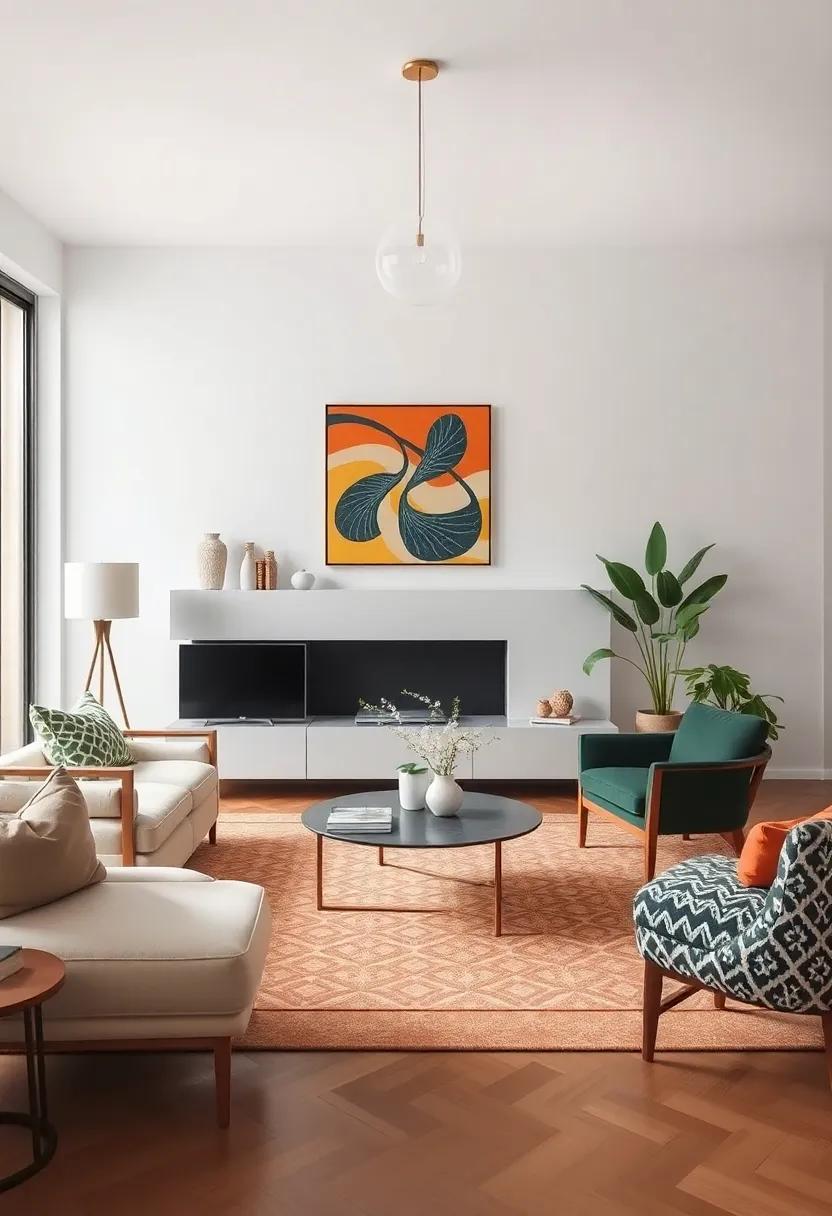
Incorporating bold artwork and patterns into your living space not only defines a room’s character but also creates a visual dialog that captivates and enchants. Key elements to consider when selecting artwork and patterns include:
- Color Harmony: Choose vibrant colors that complement each other while resonating with your overall design theme.
- Scale and Proportion: Opt for oversized artwork or patterned textiles that draw the eye and serve as dramatic focal points.
- Layering Techniques: Layer patterns and artwork of varying textures to add depth, character, and a sense of movement.
When arranging these elements within your space, aim for a balance that invites interaction and exploration. Consider using a table to visualize the impact of different combinations in your design:
| Artwork type | Pattern Style | Suggested Room Placement |
|---|---|---|
| Abstract Canvas | geometric Shapes | Over the sofa |
| Photography | Botanical Prints | Gallery Wall |
| Bold Portrait | Stripes | Accent Chair Area |
Embrace this chance to make your living room a vibrant expression of mid-century design, where both artwork and patterns intertwine to create an inviting atmosphere. The right selection of these elements can transform a simple space into a bold statement, reflecting your personality and style.
Merging Functionality with Style: Furniture Choices Redefined
In the world of mid-century living room design, bold patterns are not just an aesthetic choice; they are a declaration of character. The blend of vibrant hues and intriguing geometric shapes often seen in this style allows for a refreshing take on traditional furniture. Selecting pieces that showcase these elements can transform a mundane space into a lively, inviting environment. Consider integrating furniture options that offer both form and function:
- Patterned Upholstery: Look for sofas and chairs with loud prints, such as abstract shapes or floral designs.
- Accent Tables: Choose side tables that feature unique patterns or materials,like patterned ceramic or glass.
- Rugs: Opt for statement rugs that tie the room together while adding warmth and texture.
Beyond mere aesthetics, these choices serve a purpose in enhancing everyday living. they inspire conversations and create focal points within the room.Moreover, furniture with multi-functional designs embodies the spirit of mid-century modernism, which celebrates simplicity and practicality without sacrificing flair. Such as,curating your living space with coffee tables that double as storage or stylish ottomans that can serve as extra seating,merges aesthetics with utility in a seamless manner. A well-thought-out combination can led to an inspiring synergy of style and purpose:
| Furniture Element | Functionality | Style Feature |
|---|---|---|
| Sofa | Seating | bold Print |
| Coffee table | Storage | Unique design |
| Accent Chair | Extra Seating | Eye-Catching Pattern |
Patterns in Harmony: The Role of Rugs in Mid-Century Design
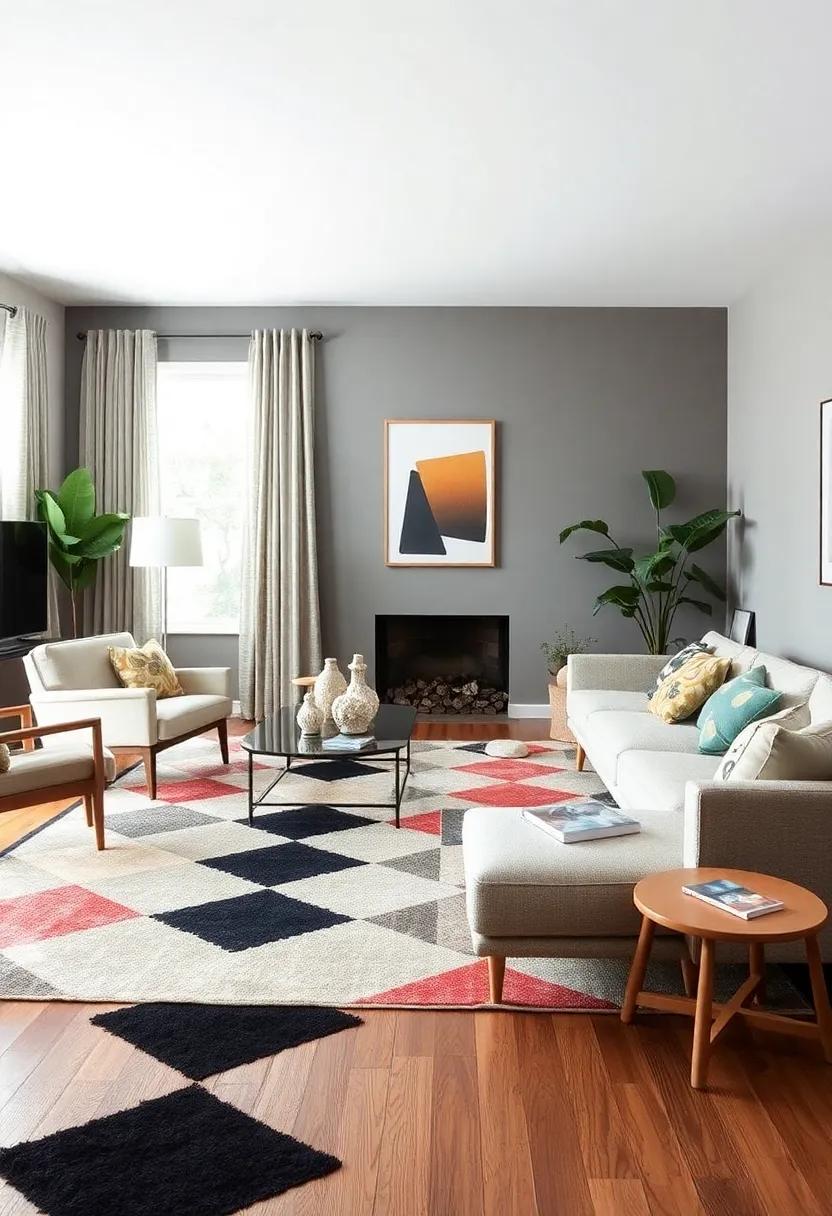
The integration of rugs in mid-century living rooms is more than just a design choice; it serves as a foundation for the entire aesthetic of the space. bold geometric patterns, vibrant colors, and varied textures characterize this era, effectively highlighting the sculptural elements of the furniture and the fluidity of the room’s layout. Rugs become the visual anchor around which the rest of the decor revolves, drawing attention to key furniture pieces and creating zones within open-plan living areas. Not only do these patterns introduce an element of fun, but they also soften the hard lines of mid-century architecture, infusing coziness into the aesthetic simplicity of the design.
Different types of rugs played distinct roles, enhancing the vibrant character of mid-century homes. Such as, hand-woven textiles frequently enough feature:
- Organic shapes: Reflecting the natural forms found in art and architecture.
- Color Blocking: Using blocks of color to create striking contrasts.
- Graphic Designs: Playful motifs that provoke conversation and creativity.
The evolution of these designs can also be represented visually; consider the following table showcasing popular rug patterns of the era:
| Pattern type | Characteristics |
|---|---|
| Chevron | Strong, zigzag lines creating a dynamic movement. |
| Floral | Abstract interpretations of blooms, adding a touch of nature. |
| Stripes | Vertical and horizontal lines fostering rhythm and balance. |
By carefully selecting and placing these rugs, homeowners not only define their aesthetics but generate a playful dialogue between the old and the new, ensuring that every inch of the space contributes to a cohesive narrative of mid-century living.
Reviving Iconic Lighting Fixtures for a Modern Twist
Incorporating vintage lighting fixtures into contemporary designs creates a captivating dialogue between history and modernity. Mid-century pieces, with their clean lines and bold colors, can infuse spaces with a unique character that resonates well in today’s design landscape. Consider the allure of a vintage arc floor lamp: its sweeping silhouette not only illuminates but also serves as a statement piece that draws the eye. When revamping these fixtures, choosing vintage-inspired bulbs can enhance their nostalgic charm while providing energy-efficient lighting.
To seamlessly blend these iconic designs with modern aesthetics, opt for a combination of warm metal finishes and textured materials.Think of pairing a striking Murano glass pendant with a minimalist dining table or contrasting gleaming brass sconces against vivid wallpaper featuring mid-century motifs.Here are some possible pairing ideas for your lighting fixtures:
- Brass with Navy Blue: Creates a dramatic, sophisticated pairing.
- Copper with Earthy Tones: Adds warmth and richness to the space.
- Ceramic with Bright Patterns: Infuses a playful touch while maintaining an elegant feel.
| Fixture Type | Colors | Best Pairings |
|---|---|---|
| Floor Lamp | Brass, Black | Leather Sofa, Geometric Rugs |
| Pendant Light | Glass, Chrome | Wooden table, Bold Artwork |
| Wall Sconce | Gold, White | Floral Wallpaper, Vintage Mirrors |
Bringing Nature Indoors with Organic Patterns and Textures
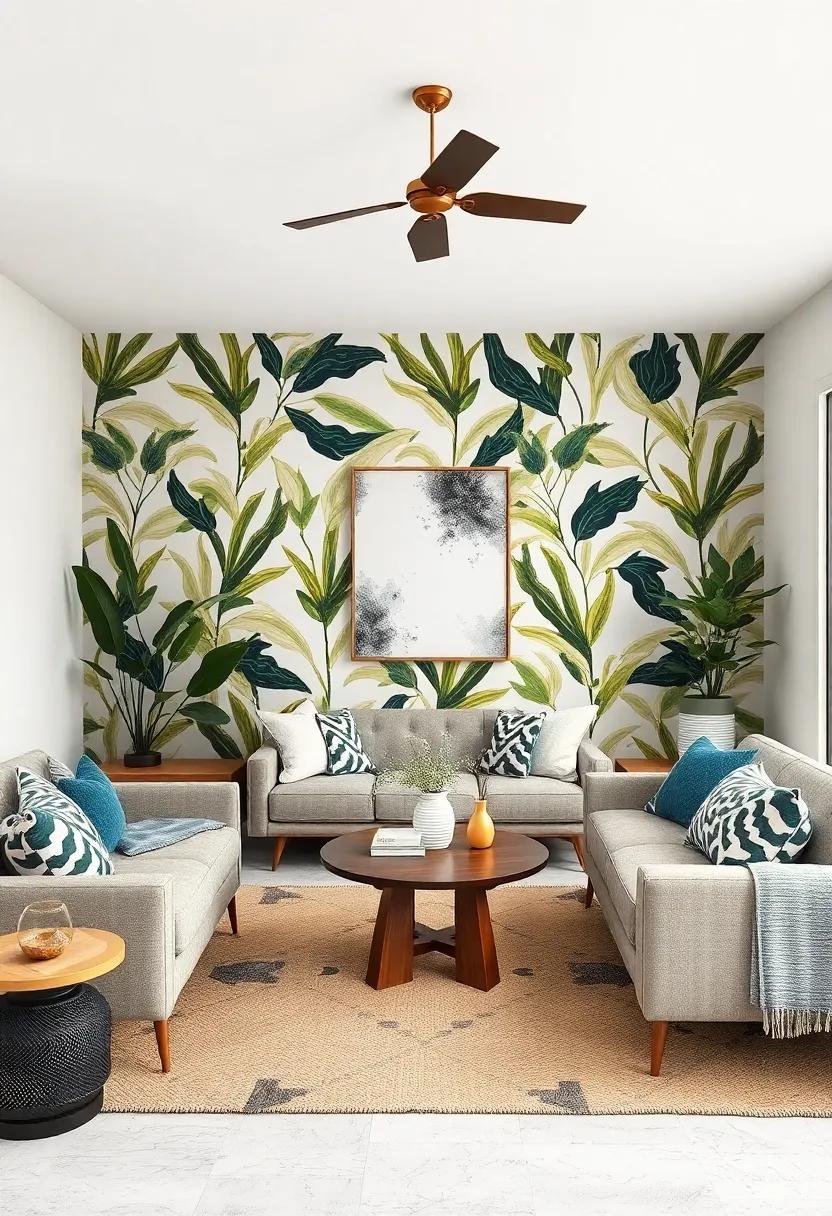
Integrating organic patterns and textures into your living space is an ideal way to evoke the essence of nature while adhering to the bold aesthetics characteristic of mid-century design. By embracing elements such as waves, leaves, and geometric shapes, you can create an inviting atmosphere that encourages relaxation and connection to the outdoors. Consider incorporating these patterns through a variety of mediums, including:
- Textiles: Choose cushions, throws, and rugs that feature lively botanical prints or earthy textures.
- Wall Art: Hang large-scale artwork showcasing organic forms to serve as a focal point within the room.
- Furniture: Opt for pieces made from natural materials, like wood and rattan, that boast striking lines and curves.
To further enhance this connection to the natural world, ensure a harmonious balance between bold patterns and the overall color palette of your living area. Use muted base colors to allow the vibrant patterns to stand out without overwhelming the space. Create a stunning visual impact by layering textures and considering the following elements:
| Element | Suggested Color | Pattern Type |
|---|---|---|
| Cushions | Earthy Tones | Floral Prints |
| Rug | Neutral Base | geometric |
| Wall Art | Vibrant Greens | Abstract Nature |
By thoughtfully curating these elements, you’ll achieve a cohesive mid-century living room that feels both fresh and reminiscent of the great outdoors.
The Influence of Scandinavian Design on Mid-Century Interiors
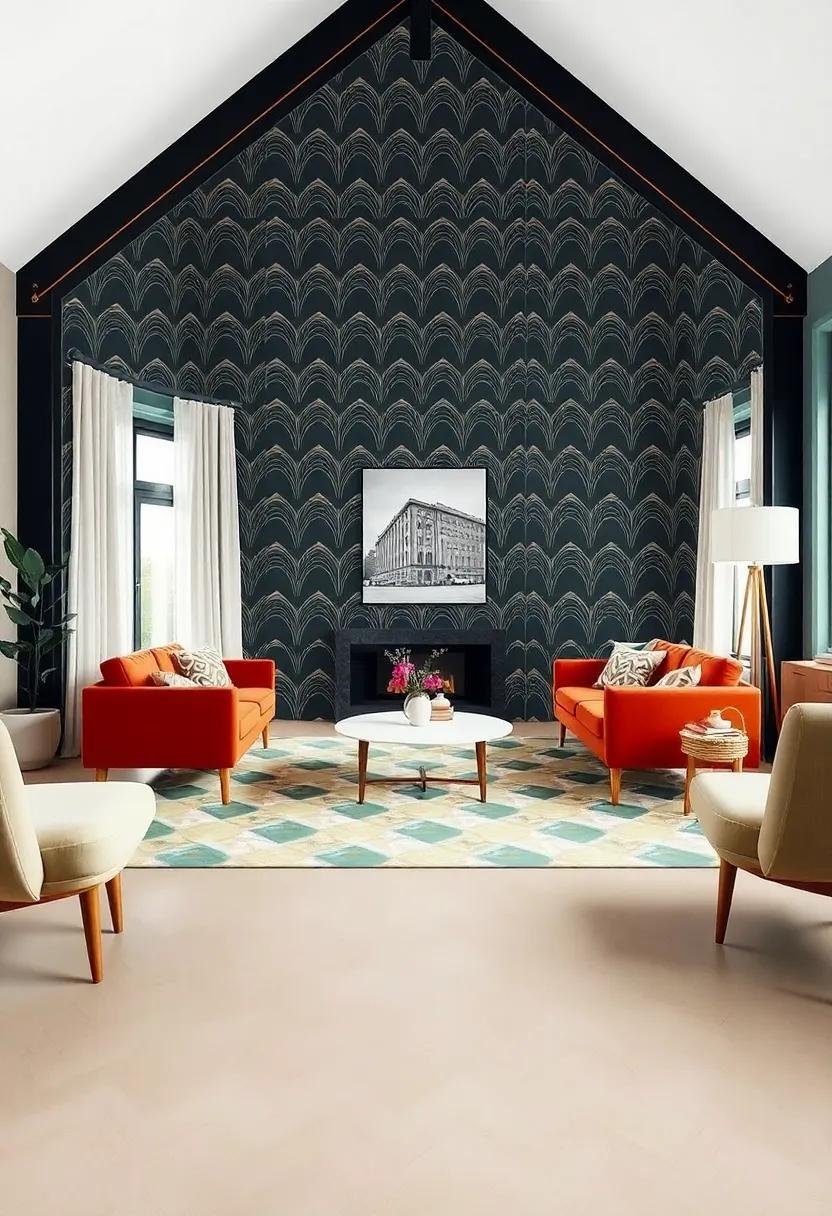
the integration of Scandinavian design within the realm of mid-century interiors is a narrative that reflects a harmonious blend of form and function. Characterized by clean lines, minimalism, and functionality, Scandinavian design emerged as a significant player during the mid-20th century. Notable elements of this influence include:
- Natural Materials: The use of wood, leather, and natural fibers brings warmth and a tactile quality to living spaces.
- Light Color Palettes: Soft hues and whites help to create bright and airy environments, perfect for showcasing bold patterns.
- Functionality: Every piece of furniture is crafted with usability in mind, promoting an uncluttered aesthetic that accentuates design elements.
Moreover, bold patterns, frequently enough deriving from traditional Nordic textiles, have found their way into the fabric of mid-century interior design. These vivid motifs serve not only as decor but as statements that add a touch of whimsy and personality to spaces. To illustrate this fusion of styles,consider the following representation of key Scandinavian design patterns that harmonize effortlessly with mid-century aesthetics:
| Pattern Type | Color Palette | Material |
|---|---|---|
| Geometric Shapes | Bold Primaries | Textiles and Wallpaper |
| Organic Flora | Pastel Mix | Cotton and Linen |
| Abstract Motifs | Monochrome | Wool and Jute |
Eclectic Mix: Layering Patterns for a Daring look
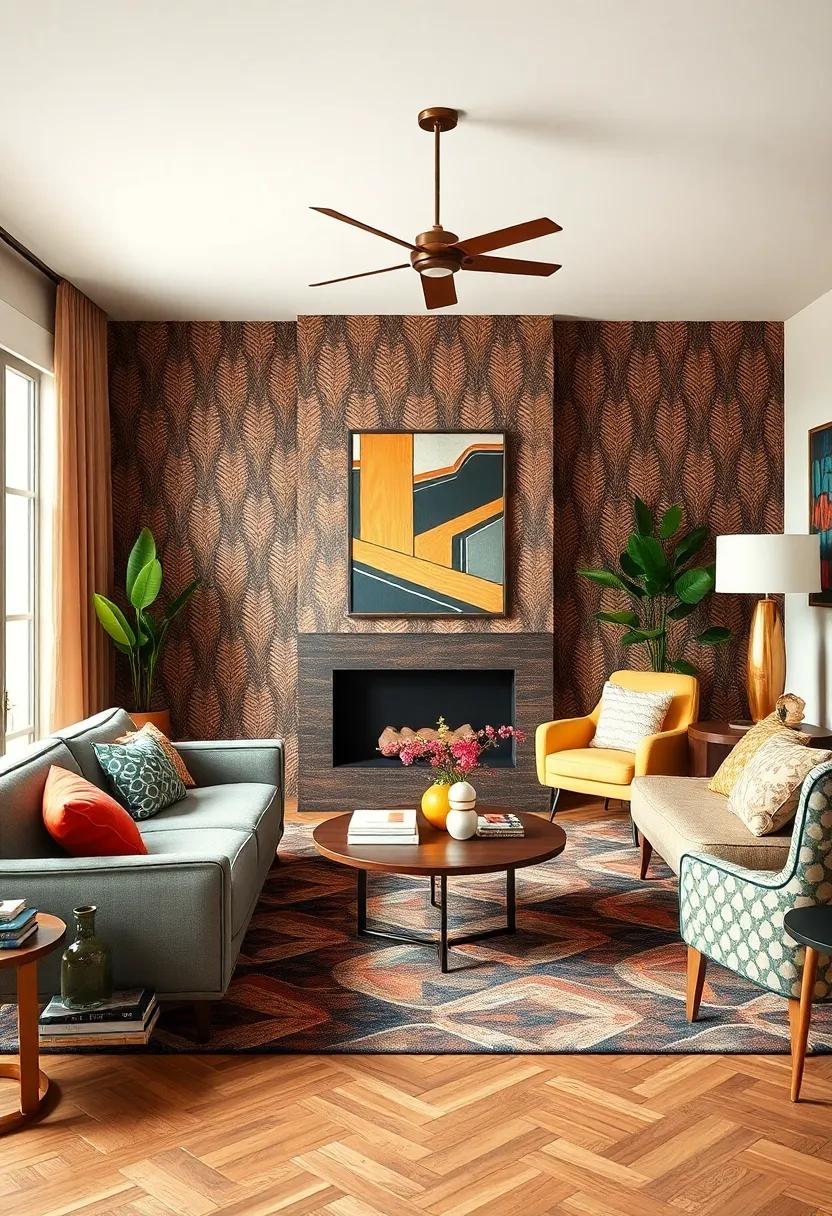
Layering patterns in interior design creates a vibrant tapestry that brings life and personality to any space. In mid-century living rooms, the fusion of geometric prints, organic motifs, and bold colors reflects a carefree, artistic spirit. To achieve this adventurous look, consider mixing the following elements:
- Geometric Shapes: Use cushions and throws adorned with angular patterns to provide a striking visual base.
- Floral Prints: Incorporate curtains or rugs with large, blooming designs for a touch of femininity and softness.
- stripes: Utilize vertical or horizontal stripes on upholstery to introduce contrast and depth.
To effectively layer these patterns without overwhelming the senses, pay attention to the color palette. Complementary hues can unify disparate designs, offering a cohesive look. You might showcase this innovative layering using a simple table to visualize combinations of patterns:
| Pattern Type | Color Scheme | Placement Idea |
|---|---|---|
| Geometric | Cool Tones | Cushions on sofa |
| Floral | warm Tones | Area rug |
| Stripes | Neutral Base | Accent chair upholstery |
The Charm of Curvy Lines in Furniture and Decor
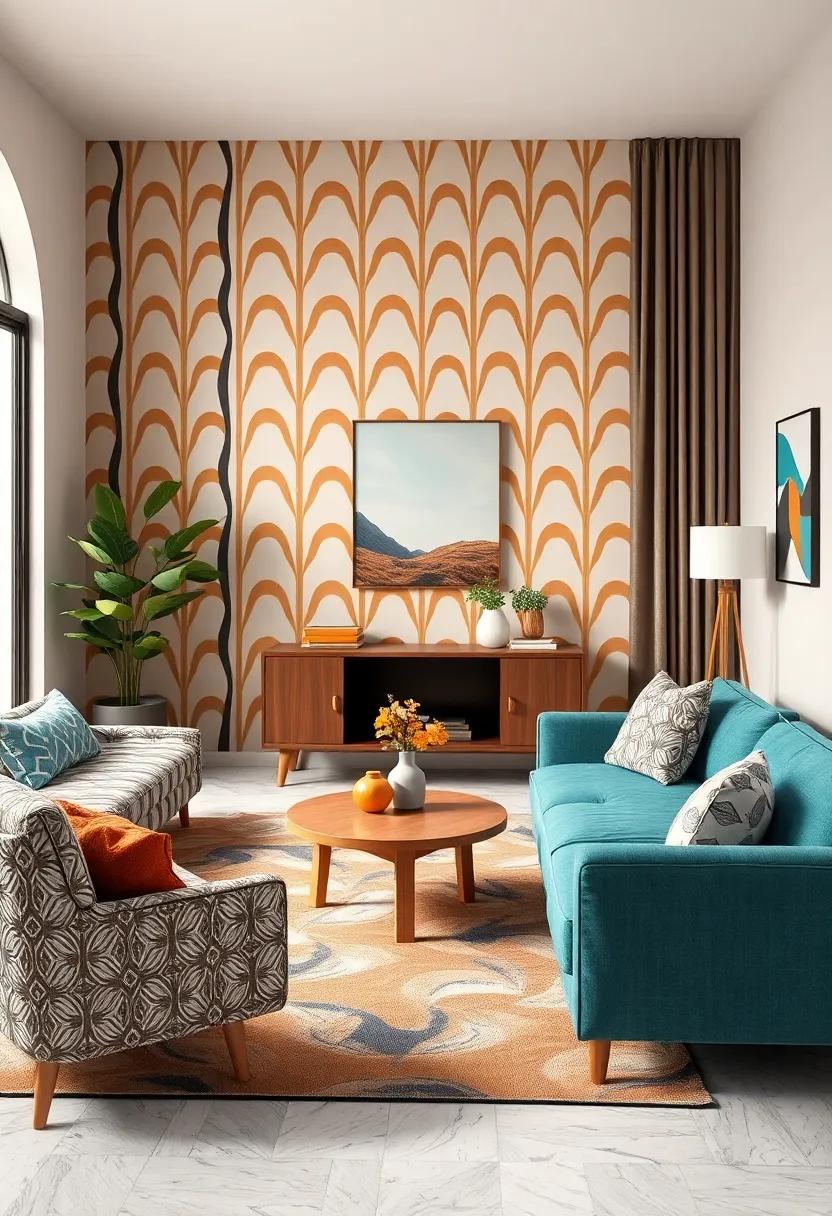
The allure of furniture adorned with curvy lines brings a sense of warmth and personality to mid-century living rooms. Unlike sharp angles, these flowing shapes evoke a sense of relaxation, inviting you to sink into their embrace. Think of the classic barrel chairs or the soft contours of a kidney-shaped coffee table; each piece feels alive,bridging the gap between comfort and aesthetics. By incorporating such curves, designers successfully add an organic touch to the structured environments typical of the era, creating a harmonious balance between nature and modern design.
Beyond aesthetics,these curvilinear forms also facilitate movement and flow within a space. Furniture arranged with gentle arcs encourages a more dynamic interaction within the room, fostering conversation and connection. Key elements that highlight this dynamic include:
- Round ottomans that double as extra seating
- Curved sectional sofas making the most of smaller spaces
- Flowing curtains that mirror the gentle lines of furniture
As you curate your mid-century space, focus on how these charming curves not only enhance visual appeal but also create an inviting environment that reflects your unique style.
Exploring the Spirit of Minimalism Through Bold Choices
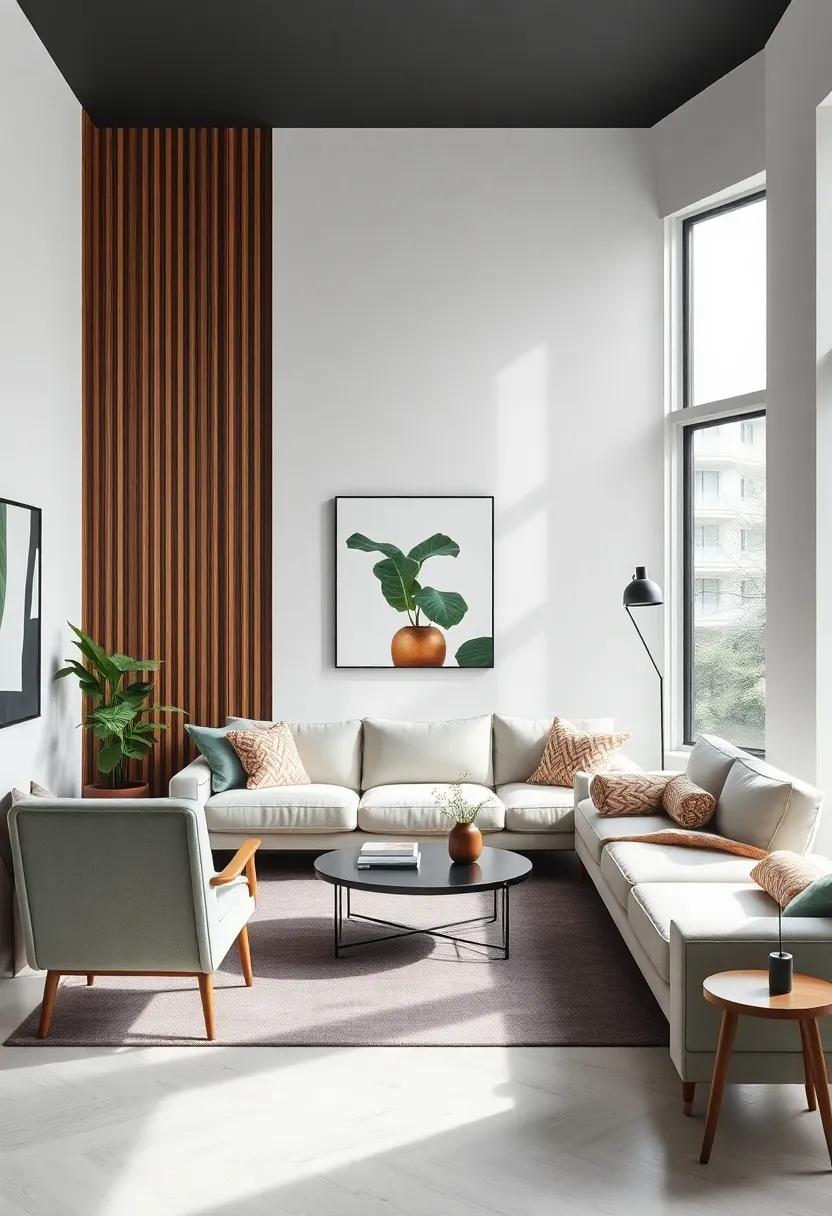
Delving into mid-century living room design invites a captivating synthesis of minimalism and creativity. This era championed the idea that less is more, yet it also applauded daring choices. One could witness the exquisite balance between clean lines and the striking vibrancy of bold patterns. The essence of this design philosophy is often expressed through elements like:
- Geometric prints – Wallpaper and textiles featuring sharp angles and playful motifs.
- Contrasting color palettes – Bright colors set against soft neutrals, providing a sense of dynamism.
- Sculptural furniture – Pieces that serve as both function and art, accentuating minimalism with bold forms.
These bold choices don’t overshadow the principles of minimalism but instead enhance them, creating an environment that feels both intimate and invigorating. To visualize this harmony, consider a living room setup where a single striped accent chair stands proudly beside a multicolored shag rug, forming a focal point amidst a sea of pastel walls. The following table illustrates ideal pairings for a balanced look:
| Element | Color/Pattern | Function |
|---|---|---|
| Accent Chair | Bold Stripes | focal Point |
| rug | Geometric Shapes | Texture & Warmth |
| Coffee Table | Stark White | Visual Anchor |
Balancing Boldness: Using Neutrals with Vibrant Patterns
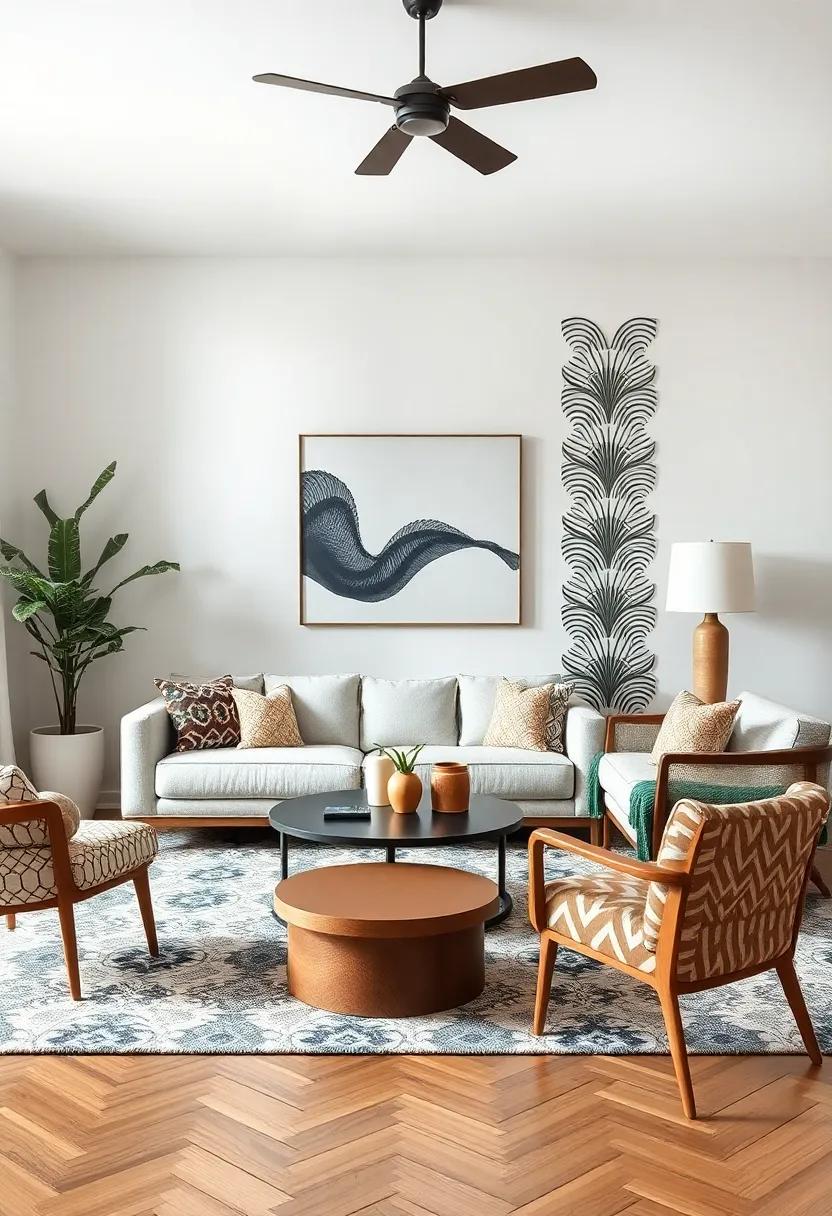
In the realm of mid-century design, pairing bold patterns with neutral tones creates an appealing visual harmony that captures attention without overwhelming the senses. Neutrals serve as the perfect canvas, allowing vibrant patterns to stand out while ensuring that the overall ambiance remains inviting.When selecting your color palette, consider incorporating shades such as:
- Soft whites to brighten the space
- Warm greys to add depth
- Beige or taupe for a earthy touch
These understated hues can beautifully enhance bold geometric patterns or floral prints, allowing them to shine as focal points in your living room. A crisp white sofa paired with eye-catching turquoise cushions or a retro patterned rug can create an inspiring contrast, enabling each piece to contribute to a cohesive narrative. To further emphasize this balance, consider strategic placements of neutral furnishings, such as:
| Furniture Type | Suggested Neutral Finish |
|---|---|
| Sofa | Soft cream |
| Coffee Table | Light oak |
| Armchair | Charcoal fabric |
By thoughtfully integrating these pieces, you create an inviting atmosphere where vibrant prints and neutral tones coexist harmoniously, celebrating both boldness and balance in your mid-century living space.
Harnessing the Power of statement Walls in Living Rooms
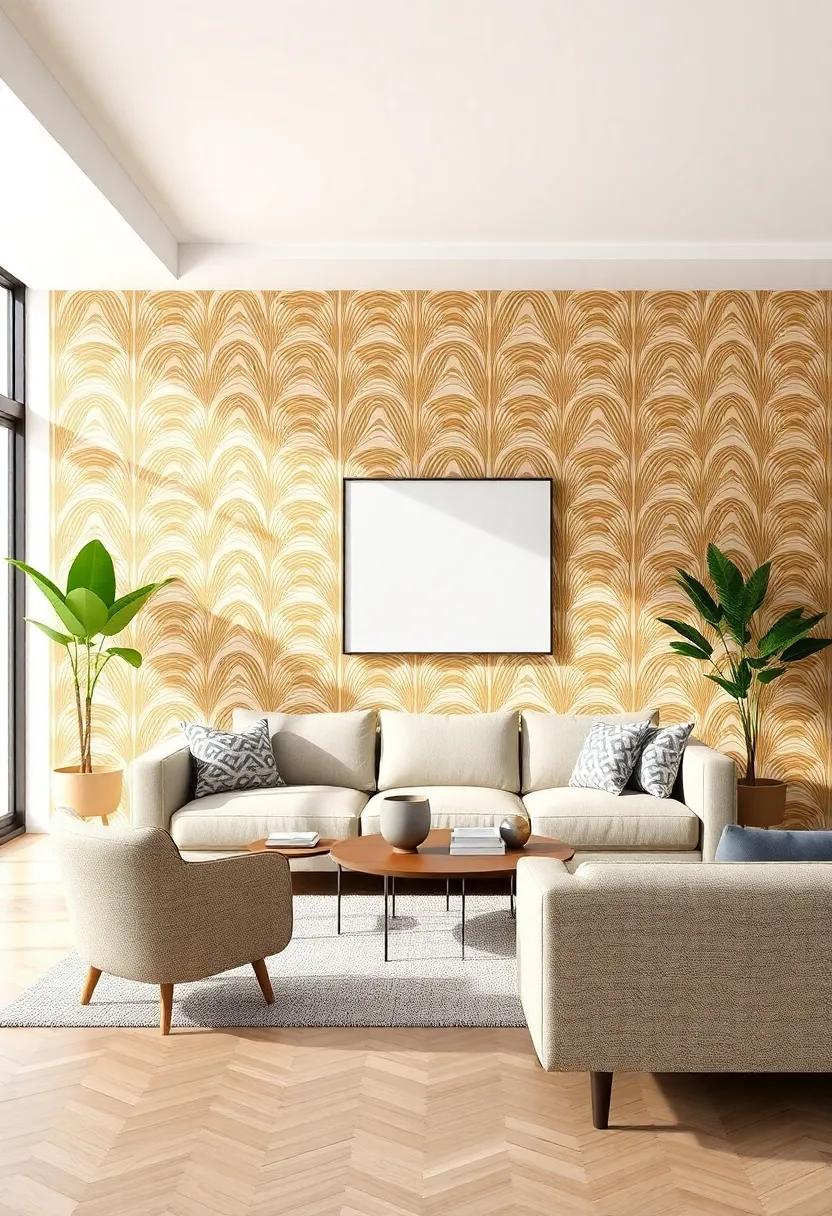
Statement walls serve as the heart of a mid-century living room, captivating with their vibrant patterns and colors. These bold designs transform a mundane space into an eye-catching focal point, embodying the essence of the era. To create a cohesive look, consider using a range of materials and textures, such as:
- Textured wallpaper – Adds depth and interest.
- Wood paneling – Provides a warm,inviting feel.
- Stencils or murals – Offer a personal touch that reflects your style.
When planning your statement wall, remember that balance is key. You want this feature to pop without overwhelming the rest of the room. Incorporate complementary furniture and accessories to tie everything together, for instance:
| Element | Complementing Color |
|---|---|
| bold-patterned sofa | Solid-colored cushions |
| Bright artwork | neutral frames |
| striking rug | Simple furniture |
By harnessing the power of a statement wall, your living room can reflect the adventurous spirit of mid-century design while ensuring a harmonious living space that invites comfort and creativity.
Crafting a Cozy Ambiance with Patterned Accessories
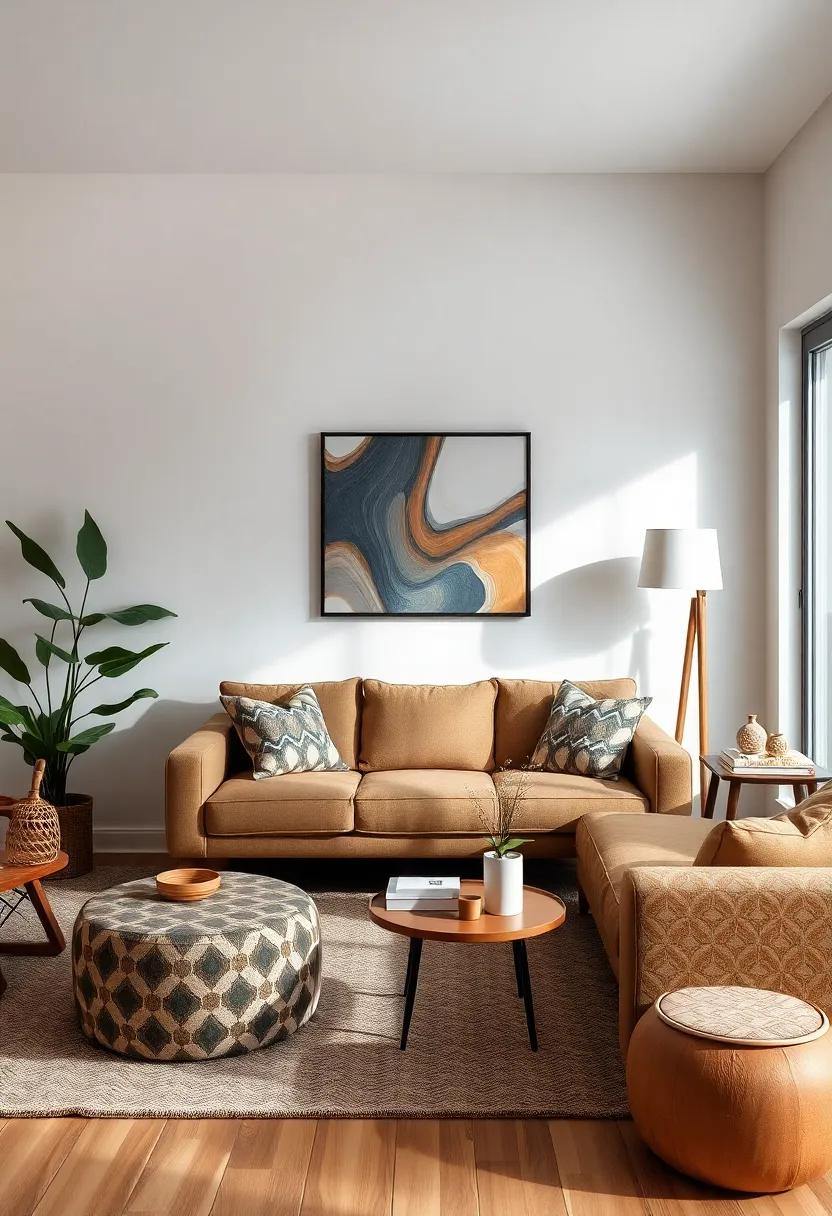
Infusing a living room with character can be effortlessly achieved through the careful selection of patterned accessories. Textiles such as cushions, throws, and rugs serve as the perfect canvas for showcasing bold designs while adding warmth to the space. When choosing these accessories, consider incorporating different shapes and colors that complement each other, ultimately creating a visual narrative. Bold patterns can transform a simple seating area into a vibrant focal point. Keep these tips in mind when curating your collection:
- Mix and Match: Combine various patterns, including florals, geometrics, and abstract designs.
- Color Palette: Use a cohesive color scheme to tie everything together.
- Layering Textures: Experiment with different fabrics such as velvet, cotton, and knits.
To maintain balance, it’s essential to choose patterns that reflect your personal style while paying attention to scale and proportion. Large patterns can be visually striking but may overpower smaller pieces; conversely, subtle prints can anchor a vibrant design.Establishing a harmony within the decor invites a sense of serenity.Consider using patterned accessories alongside minimalistic furniture for a chic contrast. Here’s a rapid reference table to help you effectively choose your accessories:
| Accessory Type | Recommended Size | Best Patterns |
|---|---|---|
| Cushions | 18″x18″ or 20″x20″ | Geometric, Floral |
| Throws | 50″x60″ | Abstract, Striped |
| Rugs | 5’x7′ or 8’x10′ | Vintage, Bohemian |
Furnishing Spaces: Mid-Century Style Meets Modern Comfort
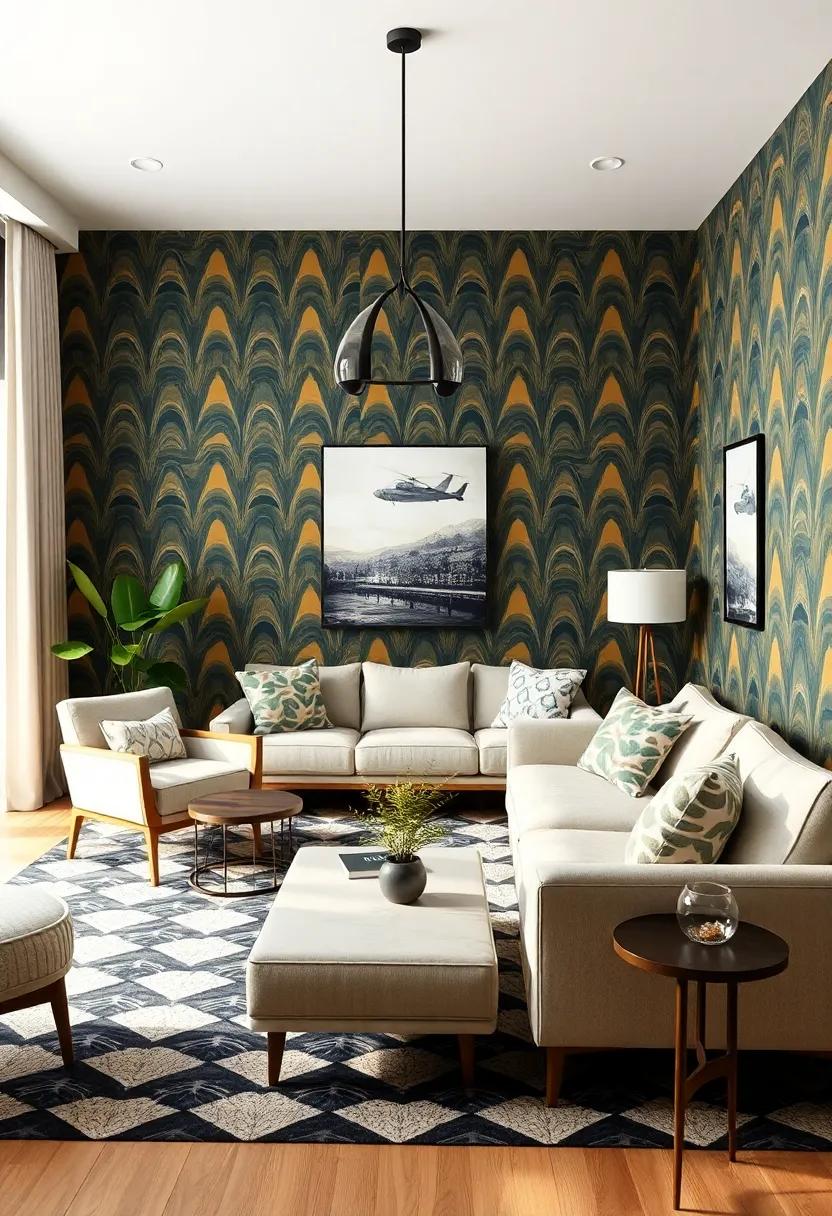
In a world where design constantly evolves, the allure of mid-century aesthetics stands out with its elegant simplicity and vibrant character. By integrating sleek lines and the boldness of patterned textiles, you can breathe life into your living room, creating a perfect balance between nostalgic charm and modern convenience. Key elements that embody this style include:
- Geometry and Color: Emphasize distinct geometric shapes in both furniture and decor, while opting for bold, saturated colors that invite warmth and enthusiasm.
- Natural Materials: Incorporate pieces made from organic textiles and woods, revealing a connection to nature that is both inviting and sustainable.
- Functional Furniture: Choose multipurpose designs that elevate comfort without compromising on aesthetics, fitting seamlessly into any contemporary home.
To further enhance the mid-century vibe, consider pairing these classic motifs with modern finishes, creating a dialogue between the past and present. A curated selection of accessories—like ceramic vases or abstract art—can seamlessly tie the room together. Here’s a simple comparison of key design elements:
| Mid-Century Features | Modern Enhancements |
|---|---|
| Rich Textured Fabrics | Smooth, Functional Materials |
| Bold Color Palettes | Subtle, Muted Hues |
| Organic Forms | Minimalist Geometry |
Incorporating Vintage Finds in Contemporary Settings
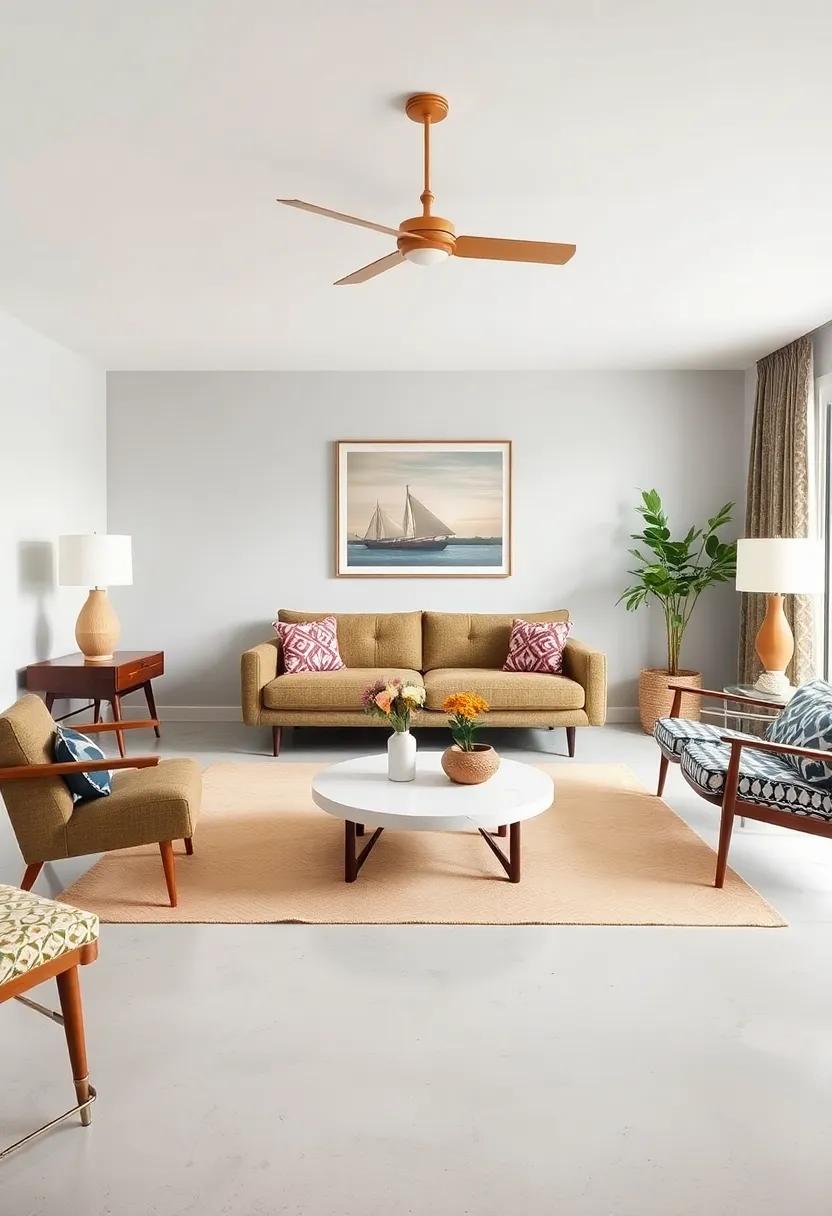
One of the most enchanting aspects of mid-century design is its ability to seamlessly blend the old with the new, creating spaces that tell a story while remaining functional and modern.Incorporating vintage furniture and decor into contemporary settings not only adds character but also serves as a conversation starter. Consider using iconic pieces such as a Danish teak sideboard or a sculptural lamp from the 1960s. These elements can create a striking focal point when juxtaposed against sleek, minimalist furnishings. pairing bold, geometric patterns with softer hues can help balance the overall look, offering a delightful contrast that invites warmth and sophistication into the room.
The key to successfully merging vintage finds with contemporary design lies in thoughtful arrangement and accessorizing. Here are some effective strategies to achieve this perfect harmony:
- Layer Textures: Incorporate tactile materials like velvet and leather to provide depth alongside wooden pieces.
- Play with Scale: Use oversized art or statement pieces above vintage accent tables to create visual interest.
- Choose a Cohesive Color Palette: Select colors that tie your vintage pieces to contemporary elements, creating a cohesive flow throughout the space.
By marrying the vibrant prints and classic forms of mid-century design with modern aesthetics, you create a visually dynamic living environment that celebrates the best of both worlds. Don’t be afraid to experiment with bold patterns as they can serve as a backdrop for these vintage treasures, bringing a playful yet sophisticated vibe that’s timelessly chic.
Showcasing Personal Stories through Patterned Decor
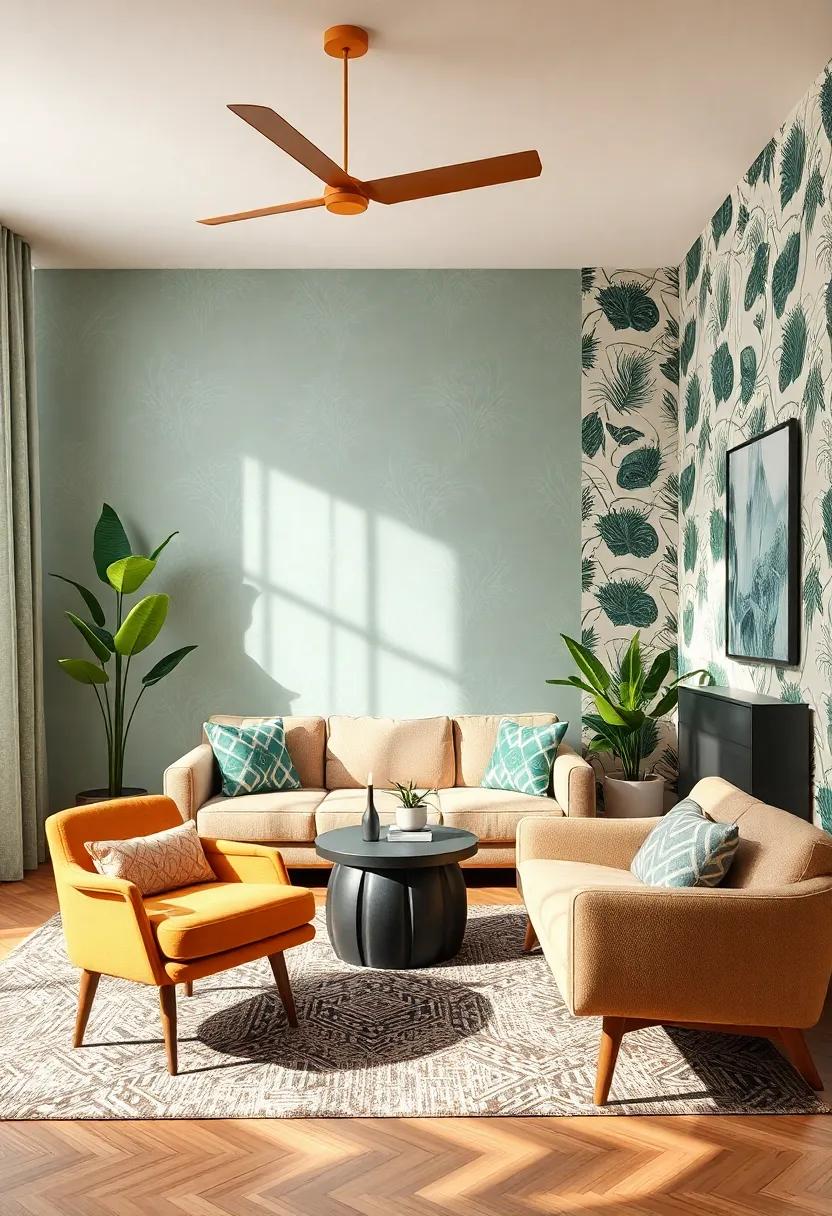
Bold patterns are not just design elements; they are storytellers that weave narratives of personal expression and evoke a sense of nostalgia. In mid-century living rooms, using patterned decor allows individuals to create atmospheres that resonate with their unique experiences. Imagine a vibrant geometric tapestry above a sleek coffee table or a floral print on a vintage sofa, each piece acts as a conversation starter, highlighting moments from travels, family gatherings, or cherished memories. Incorporating such elements invites guests into a space rich with personality, where forms and colors echo the stories of those who live there.
Consider these ways to infuse personal stories into your patterned decor:
- Family Heirlooms: use fabrics that remind you of family traditions or vacations.
- Travel Mementos: Display textiles or art purchased from meaningful trips.
- Artistic Expressions: Curate pieces that resonate with your artistic journey or creative endeavors.
Each pattern has the power to evoke memories, allowing your living room to serve as a canvas that showcases your life’s journey. By thoughtfully selecting patterns that represent your past, each corner of your home can narrate a vivid chapter filled with the essence of who you are.
Celebrating the Legacy of Mid-Century Designers in Today’s Homes
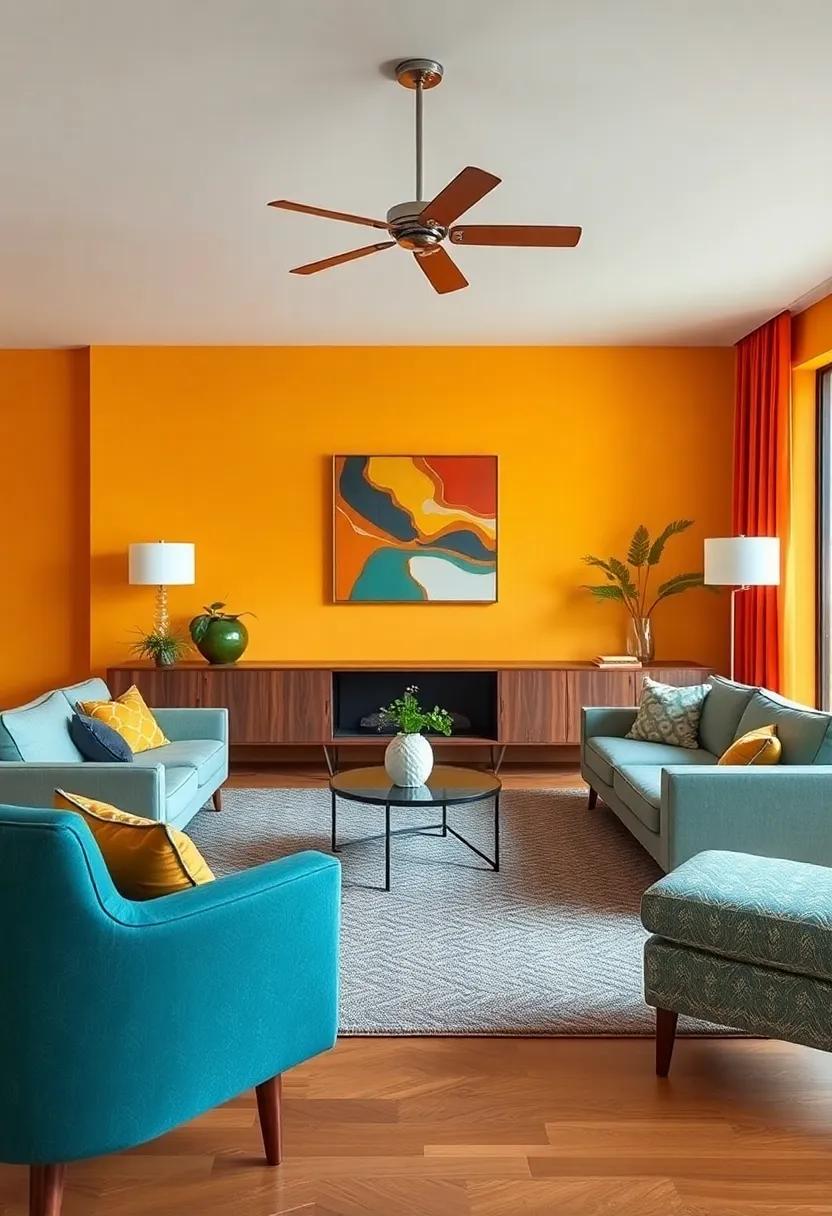
Mid-century design is celebrated for its innovative use of form, function, and color, making it a timeless inspiration for contemporary interiors. The bold patterns characteristic of this era reflect a dynamic aesthetic that resonates in today’s homes. Embracing these vibrant hues and geometric shapes transforms modern living rooms, inviting a sense of energy and personality. To bring this vision to life,consider integrating elements such as:
- statement upholstery: Opt for furniture with lively fabric showcasing abstract motifs.
- Iconic lighting: Choose pendant or floor lamps that exhibit a sculptural quality.
- Artful accessories: Use bold artwork or ceramics to create focal points that tell a story.
To effectively fuse mid-century charm with today’s sensibilities, blending textures and materials is key. This allows for a harmonious balance between the past and present while maintaining functionality in everyday life. the integration of traditional wood finishes with modern fabrics or metal accents can create a unique atmosphere. Consider this simple table for inspiration on how to mix elements:
| Element | Mid-Century Choice | Modern Twist |
|---|---|---|
| Seating | Vintage Eames Lounge Chair | Adventurous velvet upholstery |
| Coffee Table | Walnut round tables | Metal framed glass tables |
| Textiles | Geometric throw pillows | Contemporary patterns |
As we conclude our vibrant journey through the world of mid-century living room design, one thing becomes abundantly clear: bold patterns are not just a design choice; they are an invitation to express personality and creativity. These striking elements serve as a testament to the era’s innovative spirit, marrying form with function in delightful ways.Whether you’re drawn to geometric shapes, lush florals, or playful abstract motifs, embracing these patterns can breathe new life into your space, encouraging a dialogue between artistry and comfort.
as you embark on your own design adventure, remember that every pattern tells a story—your story.Let the colors and designs reflect your tastes, your history, and your aspirations.After all, mid-century design reminds us that a living room is more than just a space to gather; it is indeed a canvas of self-expression, a sanctuary of style. So, don’t shy away from the bold—welcome it. As you curate your perfect blend of pattern and texture, may your living room resonate with creativity and warmth, creating an inviting haven for all who enter. Happy decorating!


